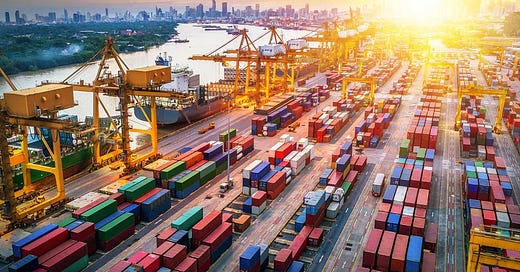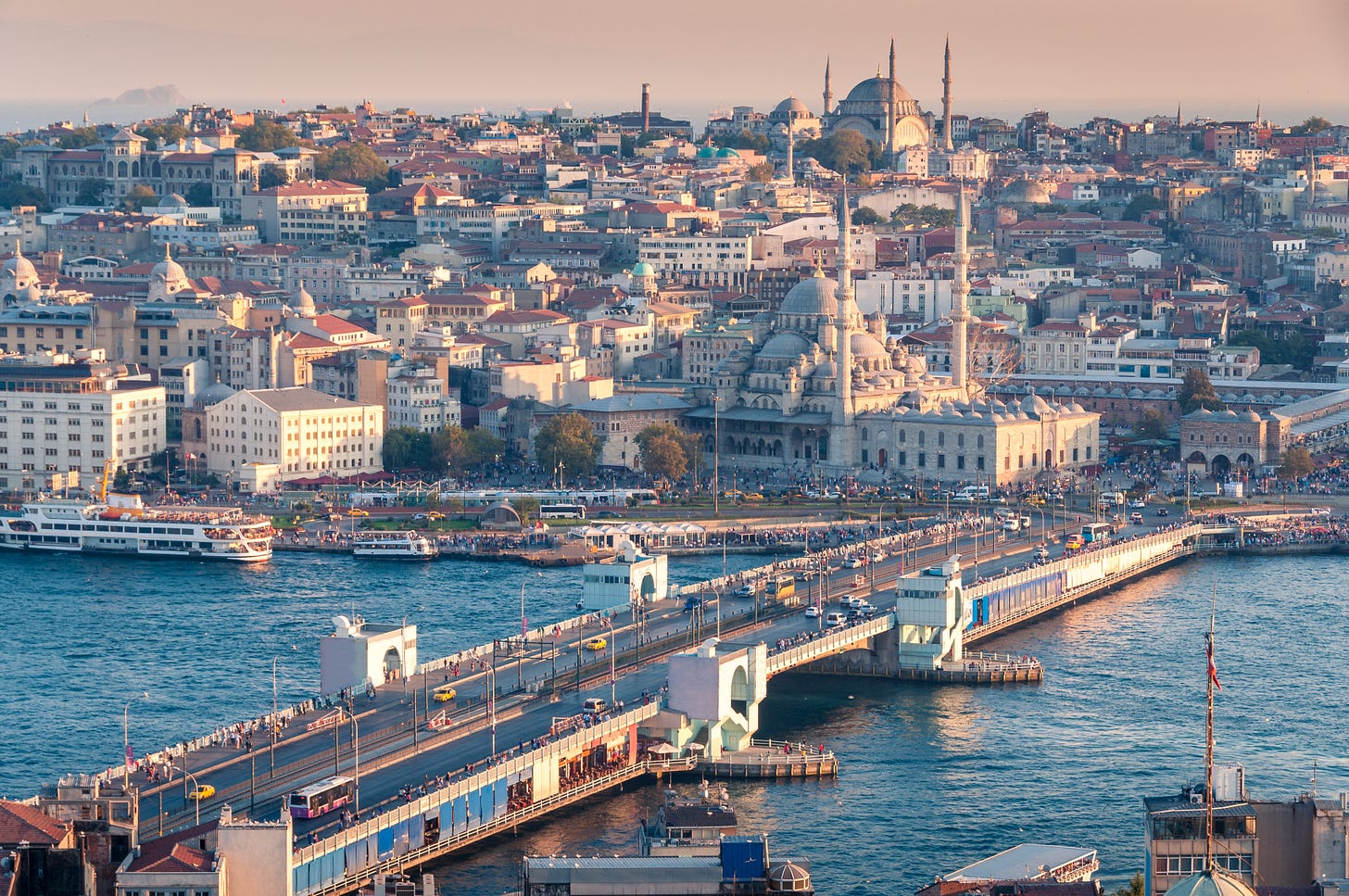Emerging Markets Daily - Sept 30
Global Supply Chain Woes, Air India For Sale, Turkish Neobank Rising, Family Offices Eye Crypto Investments, China Manufacturing Weakens
The Top 5 Stories Shaping Emerging Markets from Global Media - Sept 30
Global Supply Chain at Risk of Collapse, Baltic Dry Index Hits Peak
Financial Times and Hellenic Shipping News
“Global supply chains are at risk of collapse unless governments worldwide restore freedom of movement to transport workers and give them priority over vaccines, a coalition of international business leaders has warned.”
“In an open letter to heads of state and government attending the United Nations General Assembly, the International Chamber of Shipping and other transport groups warned that almost two years of travel bans and other restrictions had had an ‘enormously detrimental impact on [transport workers’] wellbeing and safety’.”
“The ‘mistreatment’ of workers was piling pressure on the already ‘crumbling’ global supply chain, they said, adding that any failure to act was likely to exacerbate shortages of essential goods including electronics, food, fuel and medical supplies ahead of Christmas.”
“Pandemic border restrictions, distancing requirements and factory closures have all wreaked havoc on traditional supply chains, leading to congestion at ports, delivery delays and soaring freight rates on the main shipping routes between China, the US and Europe. A shortage of transport workers had piled on the pressure, the organisations warned, and was only expected to get worse.” Gill Plimmer reports.
Meanwhile, Hellenic Shipping News reports that “The Baltic Exchange’s main dry bulk sea freight index rose to its highest in 13 years on Wednesday on higher rates for all vessels, with the capesize segment soaring to its highest level since 2008…”
“‘The increasing number of spot fixtures from the world’s largest iron ore exporters are clearly providing a boost to the dry bulk sector, in particular to the capesize market, as iron ore exports from Brazil and Australia represent the lion’s share of total capesize demand,’ BIMCO’s chief shipping analyst Peter Sand said in a note.”
Government Meets Suitors for Air India on Eve of Sale Announcement
Hindustan Times
“Senior government officials on Wednesday met representatives of the Tata Group and businessman Ajay Singh, the two bidders for Air India, as the government evaluates their financial bids, a person aware of the matter said.”
“The government is looking to conclude the divestment process of the national carrier by the end of the ongoing fiscal year and could make an announcement about the winning bidder in the coming days, the person added, requesting anonymity…”
“Press Trust of India on Wednesday reported that the financial bids for Air India are being evaluated against an undisclosed reserve price and that the bid offering the highest price above that benchmark would be accepted.”
“Air India, unprofitable since a merger with the erstwhile state-run Indian Airlines in 2007-08, had accumulated losses of as much as ₹70,820 crore till 31 March 2020, according to the latest available data.”
“The government aims to divest its entire stake in Air India before the end of the fiscal after failing to find any buyer for a 76% stake in 2018.” Hindustan Times reports.
Turkish Neobank Papara Targets 50 Million Users by 2024
Euromoney
“Bootstrapped Turkish neobank Papara has 10 million customers and will reach 50 million in the next three years, chief executive and founder Ahmed Karsli tells Euromoney.”
“Papara will be one of the first to apply for a bank licence under new Turkish legislation for digital lenders, drafted by Ankara this August. Papara is licensed in Turkey as an electronic money company, but the company could soon offer a full range of banking services to retail and small and medium-sized enterprise customers, after the new digital bank legislation comes into force early next year.”
“Unlike most neobanks in developed markets, Papara has been profitable since it was founded in 2016. It is cash-flow positive on a monthly basis. Thanks to that income, it is a bootstrapped company, meaning its growth has not relied on external funding up to now.”
“It is now raising funds, according to Karsli, for the strategic help, expertise and validation this would bring in areas such as governance.” Dominic O’Neill reports.
More Family Offices Are Eyeing Cryptocurrency Investments
Institutional Investor
“With large pools of capital to invest and a long-term horizon, family offices are increasingly looking toward digital assets.”
“These assets can store wealth and provide diversification to portfolios, according to Vincent Hayes, global head of family offices and international wealth management at BNY Mellon. Because of this, family offices are showing ‘a significant interest in cryptocurrencies and adjacent areas like NFTs and banking credit,’ he said…”
“This high level of interest did not surprise Diogo Mónica, co-founder and president of the crypto bank Anchorage Digital. Over the past few years, the bank’s clients have increased their allocations to cryptocurrencies while also expanding their investment scope beyond Bitcoin, he said.”
“‘A lot of the returns over the past couple of years have really been from the new types of cryptocurrencies that have grown faster than Bitcoin on a percentage increase basis,’ Mónica said. Because family offices have a very long-term investment horizon, they can take higher risks and have more flexibility to invest in nontraditional asset classes.” Hannah Zhang reports.
China Manufacturing Weakens as Power Cuts Grow
Wall Street Journal
“China’s manufacturing activity contracted in September, ending an 18-month expansion that powered the country’s recovery from the pandemic, with power curbs in hubs threatening further disruption.”
“China’s manufacturing purchasing managers index fell to 49.6 in September, the National Bureau of Statistics in Beijing said Thursday. That marks the gauge’s first drop below the 50 mark that separates an expansion of activity from contraction since February 2020, when the metropolis of Wuhan and surrounding Hubei province were shut down to contain the fast-spreading virus.”
“Economists polled by The Wall Street Journal had expected the official PMI to remain unchanged from August’s 50.1 reading. Instead, Thursday’s lower PMI reading was the latest worrisome sign for the world’s second-largest economy. China’s strong pandemic recovery has been beset by regional outbreaks, a global semiconductor shortage, port shutdowns and supply-chain disruptions, a widening regulatory campaign against many sectors of the economy, and soaring commodity prices.”
“More recently, concerns about power outages and a downturn in the real-estate markethave added to the list of worries.” Jonathan Cheng reports.
“I hated every minute of training, but I said, 'Don't quit. Suffer now and live the rest of your life as a champion.'“ - Muhammad Ali




